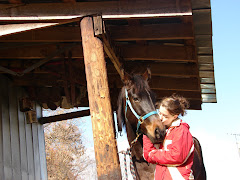Wednesday, April 23, 2008
What about boys?
I have worked with many young children and families and I have seen the “boy code” be implemented on every single one of them. When being scolded for doing girly things the boys feeling would be extremely hurt and then on top of that they say boy don’t cry making the situation even worse. No wonder so many young boys are aggressive it’s the only outlet society accepts from them! And the comment I hated most from the parents I worked with was I love my child no matter what, even though they would have just yelled at the little boy for playing dress up with his younger sister. So it is apparent that the way parents and people carry out this code onto little boys that it is only for themselves (the adults). They do it so that they are not embarrassed, because the child has no problem with doing such things until he has reprimanded enough to figure he is not supposed to do that. Honestly I think the boys have it rougher in life, especially when their young.
Tuesday, April 15, 2008
How should we respond to gender issues?
In chapter 4 Houston states “The question is rather what is the best way to achieve this freedom form gender bias. Should we undertake to ignore gender or to obligate gender differentiations, or should we in some way pay deliberate attention to gender?” I know many people say that gender is something that needs to be invisible, but honestly especially in late elementary and middle school girls are so much more prone to emotional issues. Although boys go through different changes and they can be embarrassed as well. In my past experiences if a girl raises her hand and the teacher tells her that her answer is not right she gets embarrassed and generally will not raise her hand again. Were as a guy I have noticed might get embarrassed but will bounce back much faster. So although gender does not need to be present in grading and things of this nature I think it needs to be looked at when responding and wording used to students.
Wednesday, April 2, 2008
What is gender?
Gender definition is defined as the physical difference between a man and a woman. But I think it contributes to so much more than that. It is a distinction on how we will be raised, what we do, what we are involved in, how we act, and our lives in general.
Middle school girls are affected by their self esteem throughout middle school, creating scholarly problems throughout these years. Once their self esteem drops states Sadker so does their test scores. And once they start to drop it creates more of a problem for their self esteem, a vicious cycle! Girls in the classroom are said to be eight times less likely to call out answers as boys. I think the self esteem issue has a big thing to do with it. When your feeling low that last thing you want to do is call out a wrong answer and be embarrassed in front of the class. And I think a small incident like this can lead to a girl’s fear of answering out in class, because they are easily influenced and upset at this time in their life. Where as boys develop at a later age so they call out more frequently, not caring as much if they have the wrong answer. I believe this is why teachers call on male students more frequently, because they feel they will not take criticism so hard. In Sadker’s article he states that girls that do call out get reprimanded faster. This sounds awful! I haven’t really recognized this much, but I will now be on the look out for it. Especially as emotional sensitive girls are at this age, if we reprimand them and embarrass them in front of the whole class for no reason, no wonder they don’t raise their hands and call out answers. From my stand point if a child doesn’t ask the questions that are on their mind or are not confident with the material this makes them sink lower into confidence level and makes it harder for them to understand for test time. Students need to feel open in a classroom and be able to especially ask questions. If they don’t ask then the answer may never come clear to them. I hope in my classroom I will try and be aware of who I call on and what I say, most importantly, to a wrong answer. I by no means want to crush ones confidence and self esteem, so I will try and use the scaffolding approach and guide the student to the right answer on their own, so they are proud of how they came across it.
Middle school girls are affected by their self esteem throughout middle school, creating scholarly problems throughout these years. Once their self esteem drops states Sadker so does their test scores. And once they start to drop it creates more of a problem for their self esteem, a vicious cycle! Girls in the classroom are said to be eight times less likely to call out answers as boys. I think the self esteem issue has a big thing to do with it. When your feeling low that last thing you want to do is call out a wrong answer and be embarrassed in front of the class. And I think a small incident like this can lead to a girl’s fear of answering out in class, because they are easily influenced and upset at this time in their life. Where as boys develop at a later age so they call out more frequently, not caring as much if they have the wrong answer. I believe this is why teachers call on male students more frequently, because they feel they will not take criticism so hard. In Sadker’s article he states that girls that do call out get reprimanded faster. This sounds awful! I haven’t really recognized this much, but I will now be on the look out for it. Especially as emotional sensitive girls are at this age, if we reprimand them and embarrass them in front of the whole class for no reason, no wonder they don’t raise their hands and call out answers. From my stand point if a child doesn’t ask the questions that are on their mind or are not confident with the material this makes them sink lower into confidence level and makes it harder for them to understand for test time. Students need to feel open in a classroom and be able to especially ask questions. If they don’t ask then the answer may never come clear to them. I hope in my classroom I will try and be aware of who I call on and what I say, most importantly, to a wrong answer. I by no means want to crush ones confidence and self esteem, so I will try and use the scaffolding approach and guide the student to the right answer on their own, so they are proud of how they came across it.
Subscribe to:
Comments (Atom)


